Meet this woman from Haryana who won her 'dangal' with society
Dusky with sparkling eyes and a shy smile, Vinod comes from rural Haryana – known for its skewed sex ratio, female foeticide, illegal sale of sex selection drugs, and sex determination tests.
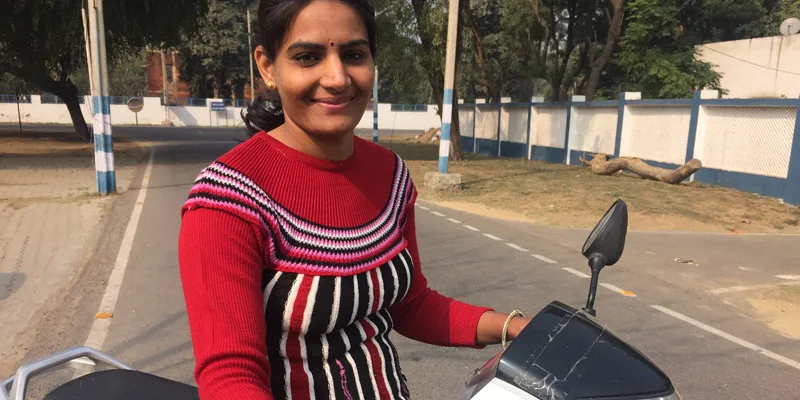
Like hundreds of girls in Haryana’s 6,000-plus villages, she grew up being taught never to defy men, to keep her eyes and her voice low, to quietly do as she was told, to not let her dupatta drop when she went out of the house.
When she was married at 16 to a boy she had never seen before, the dupatta was pulled lower over her face. It would come right down to her chest. It stayed that way even when she was tending to the four buffaloes in her in-laws house in Garanpura village, 155 km west of Delhi – bathing, feeding, and milking them. Even when she got up at 4 in the morning to finish her household chores before she left for the fields for a long day of sowing wheat or mustard or removing weeds or whatever the demands of the season might be. “Mere saas sasur acche log hain par gaon mein auraten aise hi rehti hain” (my in-laws are nice people but that’s how women live in the village), she tells me.
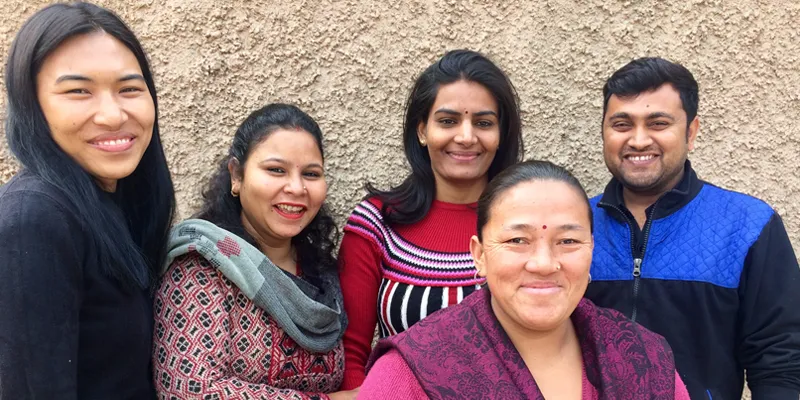
When we record this interview, Vinod, 28, is sitting beside me on a plush sofa in the beauty salon in Delhi where she now works. She is dressed in slacks and a woollen kurta (no dupatta anywhere in sight), legs crossed confidently at the knees, hands resting on her lap. She looks straight into my eyes when I ask her if she believes men are superior to women, “Sab ek se hote hai,” she says softly, “Jab unki khud ki zarurat hoti hai toh auraton se kaam kara lete hain, par aage nahi badhne dete” (everyone is equal. When they need us, they make us work but they don’t let women move ahead in life).
From behind the veil
Vinod has come a long, long way from the little girl who would cycle down to the government school in Ramalwas village in a salwar kameez and a long plait, and had to give up sports when she turned 13 since it meant going for games in the evening. She then had to give up school as well when she was married to a soldier at 16 and sent to another village. “I was waiting for my 10th standard results. By the time I found out I had scored 65 percent, I was already married and far away from my parents,” she says.
Vinod saw a parlour for the first time when an officer’s wife, who had come to attend her wedding, took her to Bhiwani. “She got my eyebrows threaded and I was completely dumbstruck by what I saw there,” she says. While her husband moved with his battalion, coming home only on his annual leave, Vinod spent the next decade in her in-laws house in Garanpura village, 150 kms from Delhi.
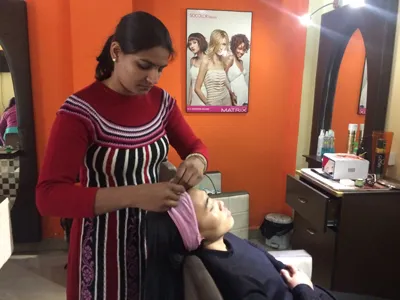
“I would get up at 4 am to feed the buffaloes, wash them, milk them, and cook for the family. By 7 am, my two younger sisters-in-law and I would go to the field where we would work the whole day. If my father-in-law was also working with us, I would do it with a ghunghat covering my face,” she says.
There was only one consolation. Vinod was allowed to write her 12th exam as a private student.
Two years back, when her husband got posted to Delhi, he brought her and their two kids – Priya and Aryan along. Vinod saw a big city for the first time and was shocked by how different it was from her village. Women wore pants and dresses, drove cars and scooters and spoke to men without any fear. “They were equal to men. That is how it should be, I thought,” she tells me shyly.
She heard about a Blossom Kochhar beautician course that was being run nearby and told her husband she wanted to join it.
“My husband is a good man but he tried to dissuade me saying elders in the village will not like it but I insisted. Finally, he gave in. He said he had kept Rs 1 lakh for the gold bangles I had been wanting for a long time. He gave me the money and told me I could use it for whatever I wanted.”
Vinod spent Rs 40,000 on the course fee, bought a scooter with the rest of the money, and asked him to teach her how to ride it.
Making the leap of faith
The first day at the course was, however, a big disaster. “When our teacher started talking about facials and manicures, I was completely baffled. I had not heard of anything other than shaping eyebrows. When my husband came back from work, I wept and told him I wouldn’t be able to do it. I had wasted his money. He was very calm, he told me to have courage. “Tune gaon se aake kitna kuch seekha hai, ye bhi seekh jaayegi. Thoda time de” (you have learnt so much after coming here from the village, you will learn this too), he said. And assured her that if she felt the same way after a while, she could leave the course. “After some days, things started making sense. At the end, I was judged the best student,” she says, a smile lighting up her face.
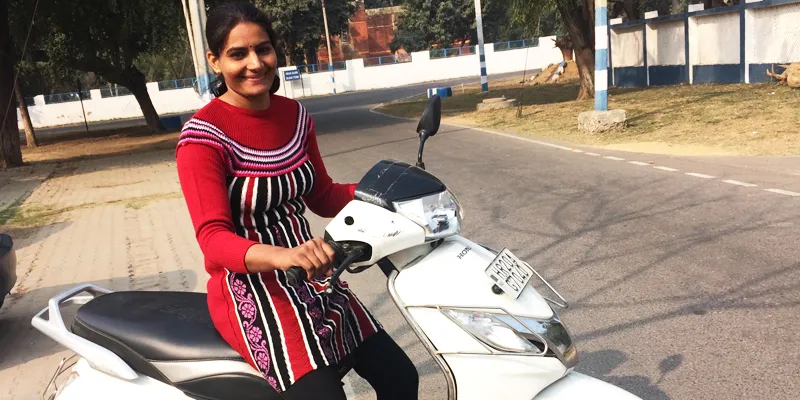
A few months later, she responded to an advertisement in the newspaper that was brought to her notice by her husband. “I drove down to the parlour on my scootie and after a test where they made me do a facial, a pedicure, and a manicure, I got the job. Vinod was now earning money, which was a first not just for her but for her village as well. She says,
“Other than two or three teachers in our village none of the women work anywhere except the house and the fields.”
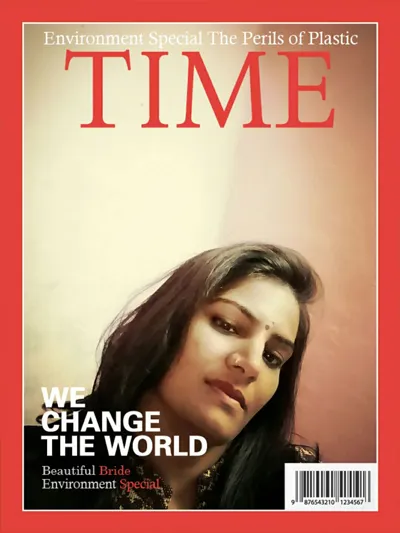
When I see her, she is confidently riding a scooter to work. She has bought her first smartphone with her own money just a day ago, and is being helped by a colleague to create a mail id. She has defied Haryana’s man-made rules that stifle women, and though the women of her village don’t speak to her anymore, they will eventually have to realise that she is a role model for their daughters in the generations to come. “Auraten hi auraton ko aage nahi badhne deti” (women don’t let other women rise), she says, disheartened by the reaction from her village.
Vinod’s daughter in studying in class five. “I want her to be a doctor. She is a very good student,” she says, proudly showing me a Time magazine shot that Priya has designed with her mother’s picture on the cover. “Jitna ham dabenge, utna his log hame dabayenge. Auraton ke kya sapne nahi hote” (the more we comply with the norms laid down by the society, the more they will pull us down. Don't women have dreams)? she asks me, simply.
I want to get up and hug her. I want to tell her that women like her who set personal examples do more for the feminism movement than any activism ever can.
But I just nod and say nothing because she won’t understand these fancy words.
And quite frankly they seem irrelevant before her achievement. More power to women like her!







